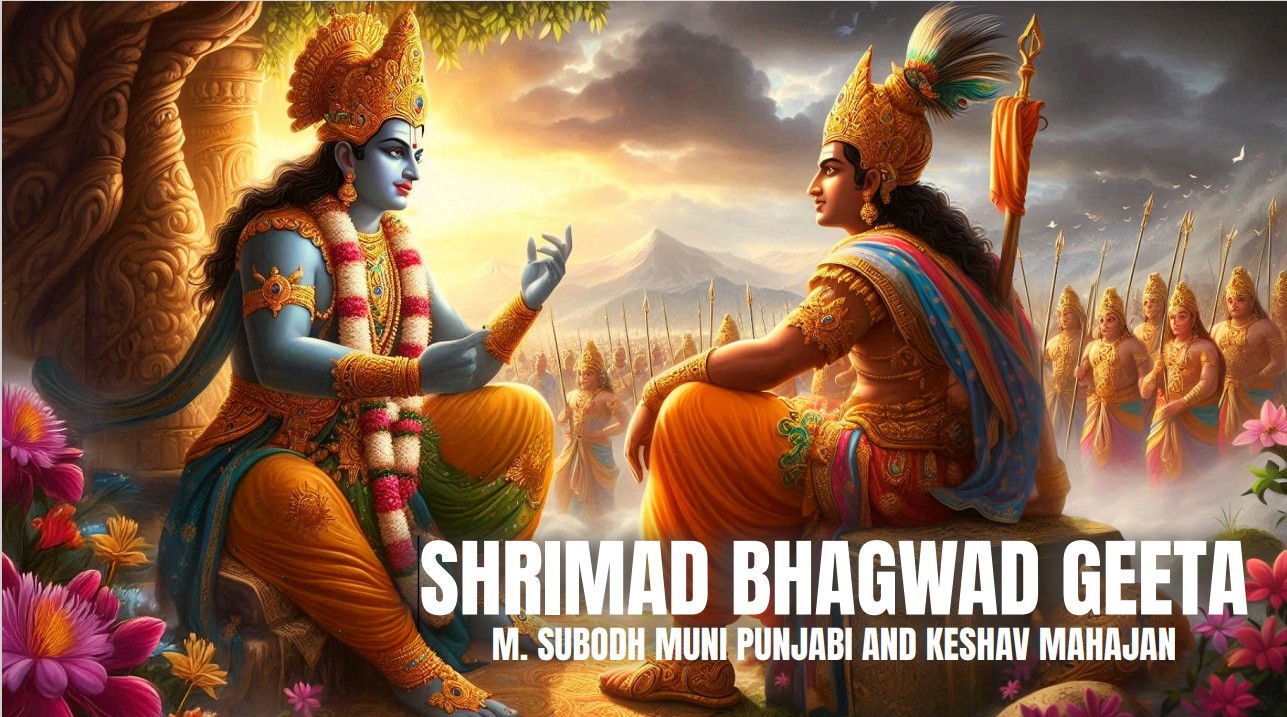THE SEVENTEENTH CHAPTER

Arjuna asked, “O Lord! What is the nature of devotion for those who forsake the Brahmavidya Shastra and worship according to their own will? Is their reverence Satoguni, Rajoguni, or Tamoguni? Please explain.”
Then Lord Krishna replied, "O Arjuna! The feelings of reverence as Satoguni, Rajoguni, and Tamoguni are inherent in the nature of beings; listen carefully. Everyone’s faith aligns with these three qualities; all beings are imbued with faith. In Satoguni individuals, Satoguna is predominant; in Rajoguni individuals, Rajoguna prevails; and in Tamoguni individuals, Tamoguna is dominant. Satoguni people worship deities associated with Satoguna; Rajoguni people worship Yakshas and Rakshasas; and Tamoguni people worship ghosts and spirits.
O Arjuna! Those who follow the Triguna Shastra in their actions have their devotion defined, but ultimately their fruits are destroyed. Now listen to those who abandon the Triguna Shastra and act arbitrarily. Such arrogant individuals, driven by various lusts, perform severe penances. They may grow long hair and nails, sit amidst five fires, perch on seats of iron spikes, hang upside down from trees, consume wine and meat in secrecy, indulge in intoxicants like charas and sulafa, lie naked on riverbanks or in forests during winter days, and compel householders to perform sacrifices for their fame so that people may proclaim them as great ascetics and devotees.
Such hypocrites harm their own souls and sadden me, the God within them
There are three types of food favored by people which reveal whether they are Satoguni, Rajoguni, or Tamoguni. Similarly, sacrifices (yagyas), penances (tapas), and acts of charity are of three kinds; now understand their distinctions.
The food that promotes longevity, strength, vigor, peace, love, happiness, and health—such pleasing and nourishing food—is preferred by Satoguni individuals. Food that is overly bitter, sour, salty, hot, dry, causing irritation or disease—such food is favored by Rajoguni individuals. Food that is excessively cold, stale, bland, putrid, or laden with meat and alcohol—is preferred by Tamoguni individuals.
Now consider the three types of sacrifices (yagyas). A yagya performed without desire for reward and with a focused mind according to the Triguna Shastra is Satoguni. A yagya done with aspirations for wealth or possessions is Rajoguni. A yagya conducted without proper offerings or mantras out of pride and not following the Triguna Shastra is Tamoguni.
Regarding penances (tapas), there are three types: physical (sharirik), verbal (vaachik), and mental (mansik). Physical tapas involve worshipping deities and learned individuals while maintaining purity and humility. Verbal tapas include speaking kindly without causing harm and sharing wisdom. Mental tapas involve contentment of soul, modesty, restraint from falsehoods, and devotion to God.
O Arjuna! Recognize those who perform these three types of penance out of love as practicing Satoguni Tapa. Those who perform penance for honor or adoration under false pretenses practice Rajoguni Tapa. And those who inflict pain upon themselves or others out of ignorance or stubbornness for wealth or harm practice Tamoguni Tapa.
Lastly, consider the three types of charity. Those who offer alms to a worthy person at a sacred place during auspicious times practice Satoguni charity.
"Those who give charity with the expectation of receiving amulets or talismans in return, or with the desire for rewards and later regret, practice Rajoguni charity. In contrast, those who donate to unworthy individuals out of anger, without respect, and in places of deceit or violence, practice Tamoguni charity.
O Arjuna! Now listen to the glory of my all-pervading, formless presence. ‘Om Tat Sat’ signifies the imperishable; it is my formless aspect, while all else is transient. By my will, this world was created; by my will, the Nirguna Gyanis and Brahmanas came into being; and by my will, the Vedas, Yagyas, Triguna knowledge, and Triguna religion were established.
Just as I manifested my Nirguna Gyan and Nirguna Dharma at the time of
creation, I also brought forth the Triguna Gyan and Triguna Dharma of the Devas. Those who follow the Triguna religion of the Devas receive their corresponding fruits and, after enjoying these fruits, ultimately suffer. However, those who adhere to my Nirguna Dharma experience eternal bliss by attaining my Nirguna form, free from birth and death.
Thus, according to my Brahmavidya, my Nirguna Gyani invokes my name in worship and dedicates all acts of charity and penance to me. My devotees, aspiring to reach me, abandon desires for rewards and worship me in various forms while performing acts of charity for my sake.
O son of Kunti! Just as I am truth itself, so are my actions and beliefs true. Sacrifices, penances, and charities performed with determination according to Triguna knowledge are indeed virtuous acts; their fruits are assuredly obtained. Although they may perish eventually, those who dedicate their
good deeds to me in accordance with Nirguna Gyan attain me.
O Arjuna! Any sacrifice, charity, or asceticism offered without reverence, out of pride, is ephemeral. Such acts do not yield fruit in the afterlife nor bring complete happiness in this world."
ITI SHRIMADBHAGWADGEETASUPANISHATSHU BRAHMAVIDYAYAM YOGSHASTRE SHRIKRISHNAARJUN SAMVADE SHRADDHATREYVIBHAG YOGONAM SAPTDASHOADHYAYAH ॥17॥
|| SHRIKRISHAN ARPAN MASTU ||
